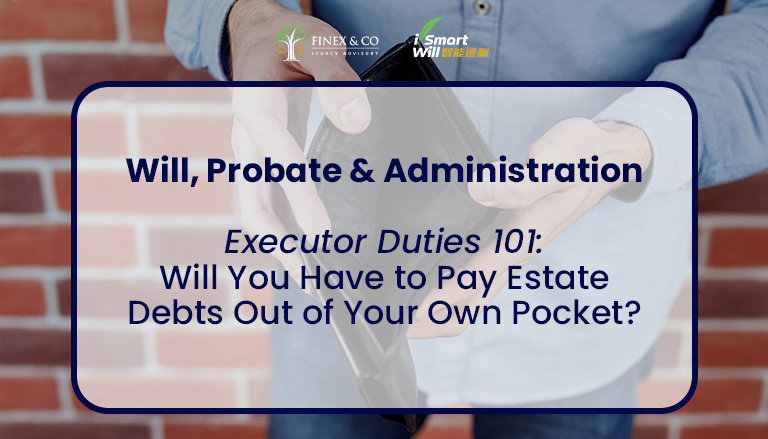Taking on the role of executor? You are probably wondering about some key responsibilities, like handling debts. No worries—let’s walk through the essential points step-by-step to make everything clear.
What Happens if There’s More Debt Than Assets?
An estate is deemed ‘insolvent’ when its debts exceed its assets. In such cases, the estate’s assets must be distributed to the creditors as if the deceased were bankrupt at the time of death. Creditors of the deceased may claim against the estate to settle the outstanding liabilities.
Am I Personally Responsible for Paying Estate Debts?
As the executor, you are not obligated to pay the estate’s debts with your own money. Your role is to handle and settle these debts using the estate’s assets. In other words, you are managing the money and assets of the deceased, not taking on their debts yourself.
Can I Be Held Responsible for Mistakes Made as an Executor?
It depends on the circumstances. As an executor, you must handle the estate with the same level of care as if it were your own. Remember, an executor has a fiduciary duty to the beneficiaries, which means you are required to act in good faith, diligently, and impartially when administering the estate. While you are not expected to be a financial or investment expert, you should reasonably consider converting income-generating assets into investments that might provide the best possible returns for the beneficiaries.
An executor who acts responsibly and with due care in performing their duties will generally not be held liable if something goes wrong. However, if the executor acts carelessly—especially if there is proven gross negligence—they may be held accountable for any losses suffered by the estate. For instance, if you make reckless investments or unauthorized expenditures on behalf of the estate, you could be personally liable to repay those losses.
What Does an Executor Actually Do?
Let’s break down your role so it’s crystal clear. As an executor, you are responsible for the following:
- Identifying Assets: You will need to locate and take possession of the deceased’s properties, notify banks and credit card companies about their passing, and may even need to set up a separate account specifically for managing the estate.
- Paying Off the Deceased’s Debts and Liabilities: A primary duty of an executor is to settle the deceased’s outstanding debts (as required by section 68(2) of the Probate and Administration Act 1959). Distributing assets to beneficiaries without covering the deceased’s liabilities could be seen as a breach of trust. This includes expenses like funeral costs and outstanding loans. Therefore, debts must be paid before distributing assets in line with the will.
- Distributing Assets According to the Will’s Terms: Once debts are settled, the remaining assets can be distributed to beneficiaries as outlined in the will.
The process might feel a bit like organizing someone else’s finances, but with these steps in place, you’ll be able to handle it smoothly.
How to Protect Yourself as an Executor ?
- Get Professional Guidance: It’s a good idea to consult a legal expert before diving into the estate administration process. This can help you sidestep potential challenges, manage the estate correctly, and protect yourself from personal liability.
- Keep Estate Funds Separate: Always use a dedicated account for estate funds, keeping them separate from your own money. This makes the financial management clearer and avoids any possible issues.
- Notify Creditors: If you are handling a medium to large estate, consider publishing a notice inviting creditors to submit claims. This ensures that any outstanding debts are addressed upfront, reducing the risk of unexpected claims later on.
Having said that, stepping into the role of executor might feel daunting, but with the right approach, it can be managed smoothly.
遗嘱执行人是否需要自掏腰包?
身为遗嘱执行人的你,可能会不知道怎么处理遗产和债务。别担心,我们一步步来,帮你理清这些重要事项!
如果债务多于资产怎么办?
当死者留下的债务超过资产时,就被认为是“资不抵债”。在这种情况下,资产将优先分配给债权人(creditor),处理方式类似于死者在去世时破产的情况。债权人可以向遗产提出索赔,以偿还死者的负债。
我需要用自己的钱来支付遗产债务吗?
身为遗嘱执行人,你不需要用自己的钱来支付遗产的债务。你的职责是用留下的资产来处理这些债务。换句话说,你是在管理死者的资产,而不是承担他们的债务。
身为执行人,我会因为犯错而承担责任吗?
这得看情况。身为遗嘱执行人,你必须像对待自己的资产一样小心谨慎地处理死者的资产。请记住,执行人对受益人负有信托责任(fiduciary duty),意味着你必须以诚信、公正和谨慎的态度来管理资产。虽然你可能不是财务或投资专家,但你需要合理考虑是否要把收益性资产转为更能带来收益的投资,以最大限度地保障受益人的利益。
如果执行人有履行到自己的职责,通常不会因意外情况被追究责任。但是,如果执行人因疏忽,尤其是严重疏忽,导致资产损失,可能会被要求承担责任。比如说,如果你为资产进行不合理的投资或未授权的支出,你可能需要个人赔偿这些损失。
遗嘱执行人具体需要做什么?
身为遗嘱执行人,你的职责包括:
- 管理资产:你需要找到并接管死者的资产,通知银行和信用卡公司,并需要专门设置一个户口来管理资产。
- 偿还死者的债务和负债:你的主要职责之一是偿还死者未还清的债务(根据Probate and Administration Act 1959第68条第2款的规定)。如果在分配资产给受益人之前未还清债务(包括葬礼费用),可能会被视为违反身为执行人的责任。因此,执行人必须先支付债务,再根据遗嘱分配资产。
- 根据遗嘱条款分配资产:在所有债务还清后,剩余的资产可以按照遗嘱的规定分配给受益人。
整个过程可能有点像整理别人的财务状况,但只要按照这些步骤来操作,你就可以顺利完成。
身为遗嘱执行人如何保护自己?
- 寻求专业建议:在开始管理遗产之前,建议先去咨询法律专家/律师是个好主意。专业人士可以帮助你避开潜在的问题,正确管理死者留下的资产,并且保护自己不用承担个人责任的风险。
- 保持遗产资金独立:使用专门的账户来管理遗产资金,不要将其与个人的资产搞乱。这样可以更清晰地管理财务,避免不必要的误解和麻烦。
- 通知债权人:如果你管理的资产价值较大,建议发布公告,让债权人提交索赔。这样可以确保任何未清债务都能在早期得到处理,减少以后出现被索赔的风险。
换句话说,成为遗嘱执行人是蛮有压力,但只要根据正确的方法,管理起来并不复杂。















